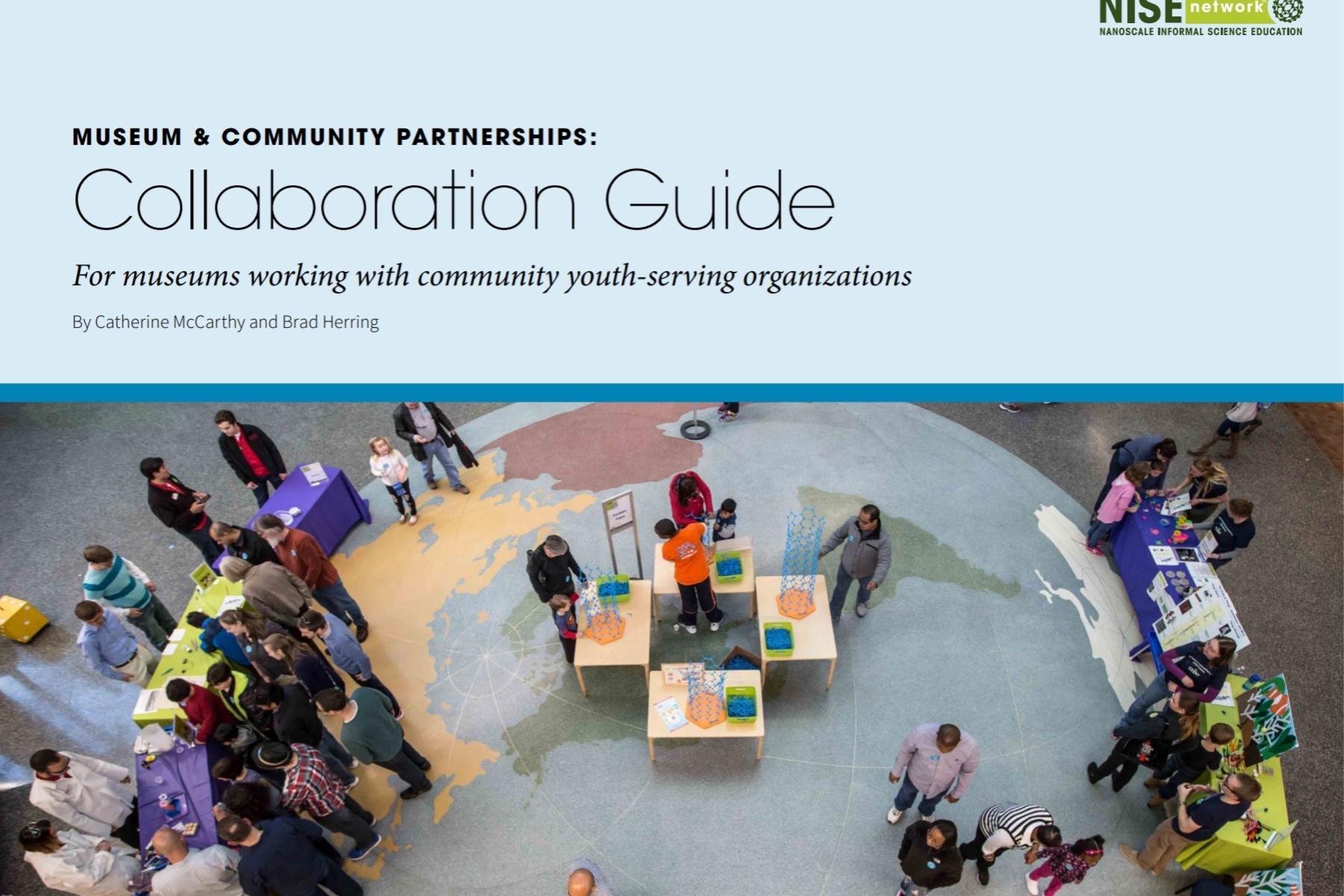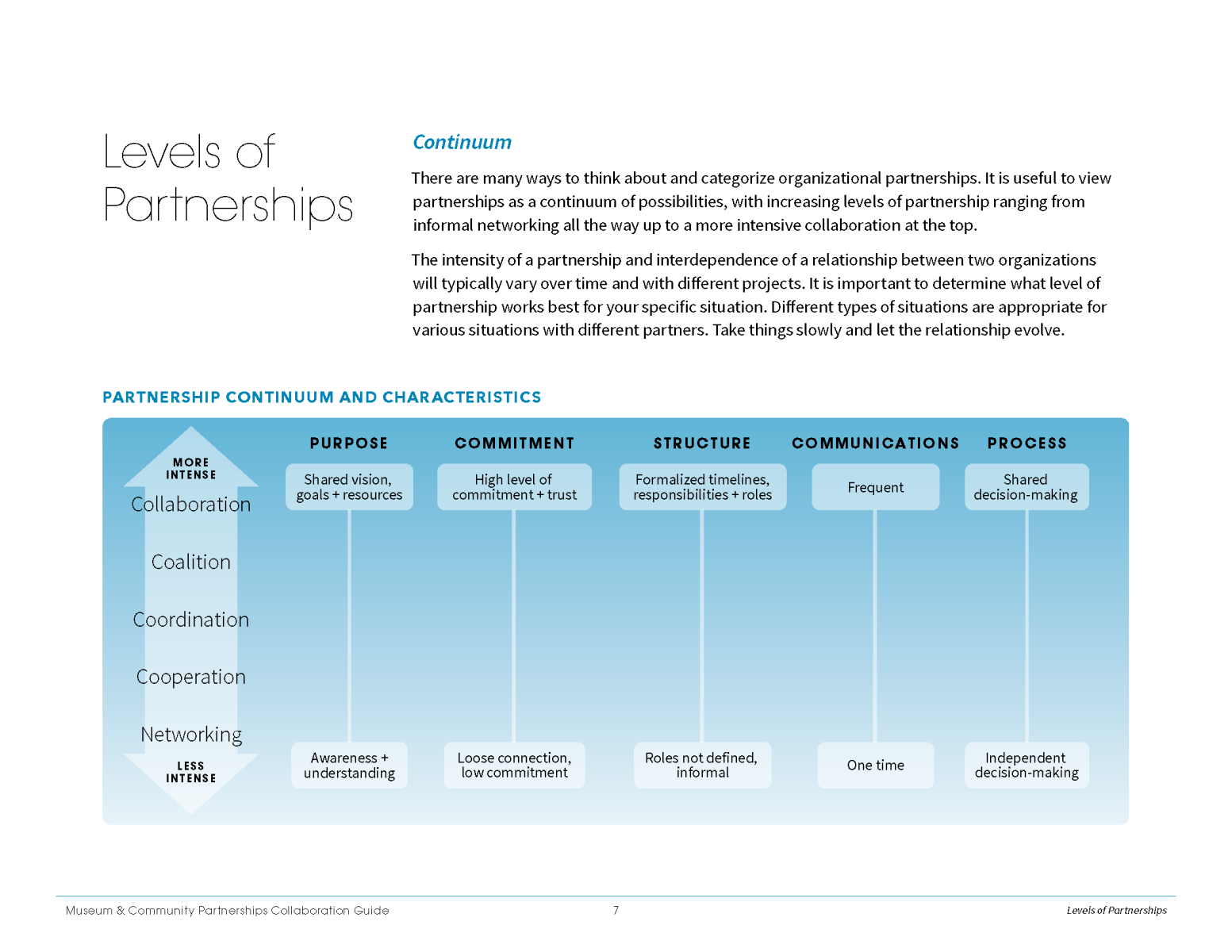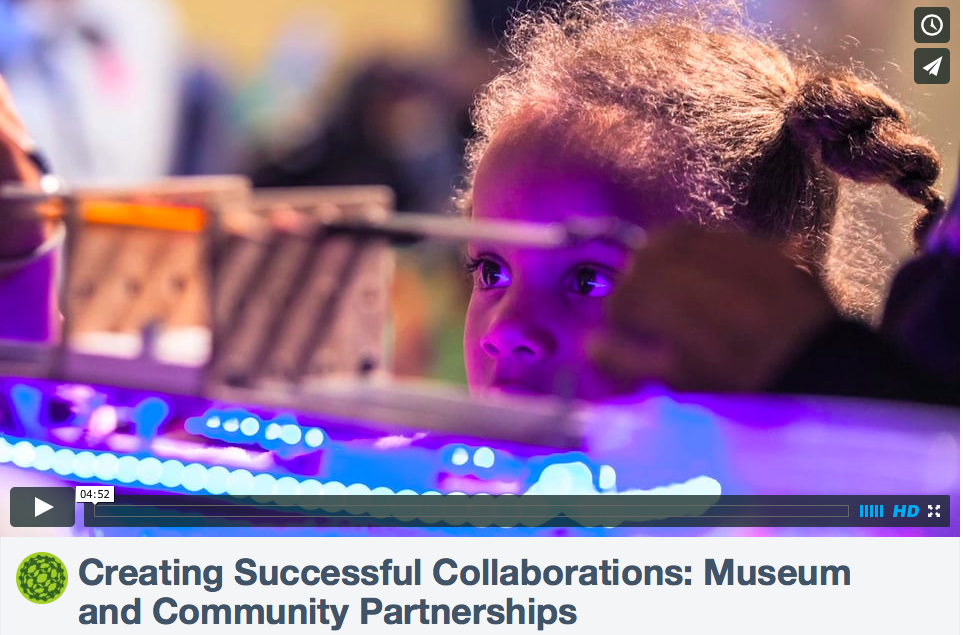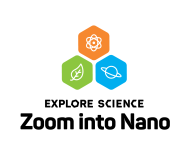DESCRIPTION
This guide offers an introduction to collaborations between museums and youth-serving community organizations. While this guide is designed specifically for museums and community organizations, much of the content contained in this document can be applied to all kinds and levels of partnerships. This guide includes an overview of why to collaborate, levels of partnerships, how to start a partnership, and a variety of resources to sustain and deepen your collaborative relationships. Sprinkled throughout this document is advice from experienced collaborators as well as examples of different ways museums and community organizations are collaborating to increase access for underserved audiences, improve STEM equity, increase school readiness, support family learning, and engage different audiences.
In addition to the guide resources to assist museums in creating and sustaining partnerships with youth-serving community organizations include: • video on "Creating Successful Collaborations:
- Museum and Community Partnerships" (5 minute video)
- memorandum of understanding (MOU) sample template,
- collaboration tips,
- profiles of national youth-serving organizations,
- sample text for invitation to collaborate on the Museum & Community Partnerships project
Collaborating with an existing youth-serving organization on STEM activities is an effective way for museums and university outreach programs to connect with audiences they may not regularly reach, particularly underserved audiences. The following profiles of national youth-serving organizations have been compiled to assist museums and university outreach programs in developing partnerships with a community organization or a local chapter of a national youth-serving organization. These profiles are intended to provide a brief introduction to each organization. Profiles include: 1. 4-H, 2. Afterschool Alliance, 3. Boys & Girls Clubs of America, 4. Boy Scouts of America, 5. Girls Inc., 6. Girl Scouts, 7. Libraries, 8. National Girls Collaborative Project, 9. Parent Teacher Association (PTA), 10. Y (YMCA), and 11. YWCA
Suggested Citation:
McCarthy, C. and B. Herring (2015). Museum & Community Partnerships: Collaboration guide for museums working with community youth-serving organizations. Saint Paul, MN: Science Museum of Minnesota for the NISE Network. https://www.nisenet.org/collaboration-guide
DESCRIPTION
This guide offers an introduction to collaborations between museums and youth-serving community organizations. While this guide is designed specifically for museums and community organizations, much of the content contained in this document can be applied to all kinds and levels of partnerships. This guide includes an overview of why to collaborate, levels of partnerships, how to start a partnership, and a variety of resources to sustain and deepen your collaborative relationships. Sprinkled throughout this document is advice from experienced collaborators as well as examples of different ways museums and community organizations are collaborating to increase access for underserved audiences, improve STEM equity, increase school readiness, support family learning, and engage different audiences.
In addition to the guide resources to assist museums in creating and sustaining partnerships with youth-serving community organizations include: • video on "Creating Successful Collaborations:
- Museum and Community Partnerships" (5 minute video)
- memorandum of understanding (MOU) sample template,
- collaboration tips,
- profiles of national youth-serving organizations,
- sample text for invitation to collaborate on the Museum & Community Partnerships project
Collaborating with an existing youth-serving organization on STEM activities is an effective way for museums and university outreach programs to connect with audiences they may not regularly reach, particularly underserved audiences. The following profiles of national youth-serving organizations have been compiled to assist museums and university outreach programs in developing partnerships with a community organization or a local chapter of a national youth-serving organization. These profiles are intended to provide a brief introduction to each organization. Profiles include: 1. 4-H, 2. Afterschool Alliance, 3. Boys & Girls Clubs of America, 4. Boy Scouts of America, 5. Girls Inc., 6. Girl Scouts, 7. Libraries, 8. National Girls Collaborative Project, 9. Parent Teacher Association (PTA), 10. Y (YMCA), and 11. YWCA
Suggested Citation:
McCarthy, C. and B. Herring (2015). Museum & Community Partnerships: Collaboration guide for museums working with community youth-serving organizations. Saint Paul, MN: Science Museum of Minnesota for the NISE Network. https://www.nisenet.org/collaboration-guide
TRAINING VIDEOS
DOWNLOAD FILES
- Collaboration Guide (PDF)
- Memorandum of Understanding (MOU) Sample Template (DOCX)
- Collaboration tips (PDF)
- Collaboration tips (DOCX)
- Profiles of national youth serving organizations (PDF)
- Profiles of national youth serving organizations (DOCX)
- Sample text for invitation to collaborate on the Museum & Community Partnerships project (DOCX)
- Community Collaborations Overview (PDF Slides)
Credits
Science Museum of Minnesota
Developed for the NISE Network with funding from the National Science Foundation under Award Numbers 0532536 and 0940143. Any opinions, findings, and conclusions or recommendations expressed in this product are those of the authors and do not necessarily reflect the views of the Foundation.
Creative Commons Attribution Non-Commercial Share Alike 3.0 United States (CC BY-NC-SA 3.0 US).
View more details

NISE Network products are developed through an iterative collaborative process that includes scientific review, peer review, and visitor evaluation in accordance with an inclusive audiences approach. Products are designed to be easily edited and adapted for different audiences under a Creative Commons Attribution Non-Commercial Share Alike license. To learn more, visit our Development Process page.




